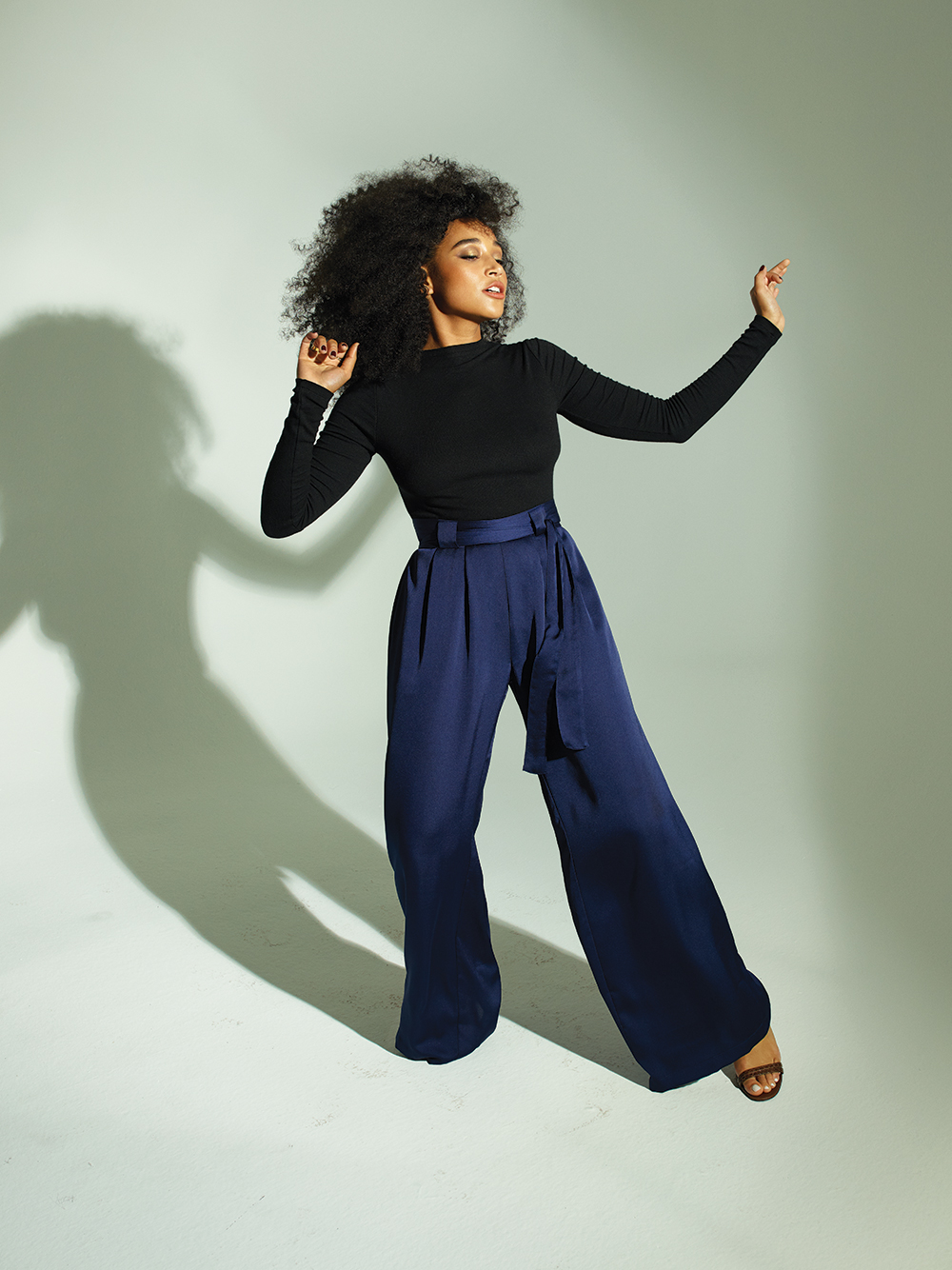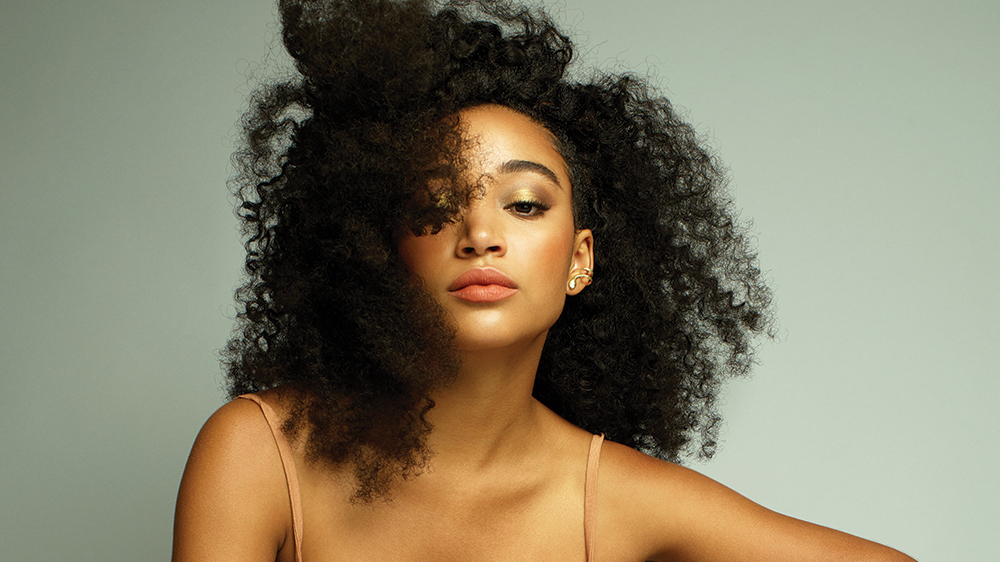Amandla Stenberg on ‘The Hate U Give,’ Beyonce, and Hollywood Diversity
By Elizabeth Wagmeister
LOS ANGELES (Variety.com) – As one of the only biracial young actresses on studio short lists, Amandla Stenberg feels the pressure to do the right thing. When Marvel came knocking for “Black Panther” a few years ago, Stenberg agreed to an audition. But she eventually chose not to pursue the role of Shuri, because she believed a darker-skinned actress should play the breakout part that went to Letitia Wright.
“That was not a space that I should have taken up,” says Stenberg, who is 19. “And it was so exhilarating to see it fulfilled by people who should have been a part of it and who deserved it and who were right for it. I just wasn’t.”
Stenberg knows something about big-screen blockbusters. At 14, she portrayed the fan-favorite Rue in “The Hunger Games.” “It was all a dream come true,” she says.
“As a kid, it was my favorite book.” She recently saw co-star Jennifer Lawrence at a breakfast event. “She said, ‘Oh, my God, you have boobs!’” Stenberg recalls with a laugh.
“And I said, ‘Yeah, I’ve gone through puberty since I last saw you.’ We don’t stay in touch necessarily in the way we used to. But she will definitely always remain as a big-sister figure to me, just because she was so endlessly sweet to me when I was a kid and made me feel comfortable in a space that was intimidating.”
Diverse and nuanced representation on-screen is what guides Stenberg’s business decisions. She signed up for the teen thriller “The Darkest Minds,” which is currently in theaters, because she thought it was important to have a new take on the young-adult dystopian genre. “The character was written white,” she says. “It was exciting for me to have a black girl at the helm, because we’ve seen these with Jennifer Lawrence and Shailene Woodley, and they’ve done a fantastic job. But we’ve never gotten diverse representation.”
Her memories of working on movie sets are generally positive, even though she concedes she has experienced moments of racism and sexism in the industry. “I can speak to certain events, but I don’t necessarily want to,” she says.
Stenberg is hopeful about the change she’s witnessing with the industry’s recent wave of inclusive storytelling — from “Black Panther” to “Crazy Rich Asians,” both box office successes. “As a kid, it was nearly impossible for me to find roles that felt empowered, that were not victim roles, that were fully dimensional, that didn’t serve any white male plotline,” she says. “So I worked less because I had no interest in doing something that would force me to compromise my own power or just make myself subservient to something I didn’t necessarily mesh with.”
She’s motivated to work on projects that open more doors for women of color. She talks about how the media often lumps her in with two other biracial actresses, Yara Shahidi (“Grown-ish”) and Zendaya (“Spider-Man: Homecoming”). “Something interesting has happened with me and Yara and Zendaya — there is a level of accessibility of being biracial that has afforded us attention in a way that I don’t think would have been afforded to us otherwise,” Stenberg says. “Me and Yara and Zendaya are perceived in the same way, I guess, because we are lighter-skinned black girls and we fill this interesting place of being accessible to Hollywood and accessible to white people in a way that darker-skinned girls are not afforded the same privilege.”
Her latest project speaks to the times that we live in. She’s the lead in the Fox 2000 drama “The Hate U Give,” based on the 2017 best-seller about Black Lives Matter. Stenberg was a junior in high school when she was cast as Starr Carter, the ambitious heroine who witnesses a case of police brutality. As the film progresses, Starr must decide if it’s worth sacrificing her family’s safety to speak the truth and commit her life to activism. “,” which premieres at the Toronto International Film Festival before opening in theaters on Oct. 19, is a breakthrough character-driven vehicle, sure to elevate Stenberg’s standing in Hollywood. “It’s portraying a really rich and deep black contemporary experience,” she says.
As soon as she received the unpublished manuscript for the novel, Stenberg was sold on the role. Like Starr, she grew up in a black community — what she describes as lower-income neighborhood of South Los Angeles — and traveled an hour and a half across town to attend a wealthy, predominantly white private school in West L.A. Stenberg says she felt as though the part was written for her and wondered if the book’s author, Angie Thomas, somehow knew about her life. As it turns out, Thomas had written the novel with Stenberg in mind.
The actress worked closely with screenwriter Audrey Wells to infuse more of herself in the character. “I would go to sessions with Audrey in order to provide my experience as a black girl because Audrey is white,” Stenberg says. “Anything that struck me as inauthentic or not accurate to me and Starr’s experience, I would communicate it. From early on, the nature of the project was collaborative. I didn’t feel like I was just fulfilling the role of an actor. I felt like I was doing a lot more.”
Director George Tillman Jr. noticed that Stenberg innately inhabited the character. “She’s not afraid to stand up for what she believes in and live the way she wants to live,” he says. “A lot of young people are doing that now. She’s in the middle of this movement.”
“The most powerful thing you can do is be yourself and express joy and incite joy in others, so I feel more compelled than ever to do that.”
The studio was also interested in Stenberg for “The Hate U Give” because of her activism. In 2015, she made headlines when she posted a high-school project on Tumblr — a video titled “Don’t Cash Crop My Cornrows.” She took issue with white celebrities like Kylie Jenner for appropriating black culture without using their platform to shed a light on real-world problems such as police brutality.
But she resents the notion that she’s putting herself in a box. “I think the media placed a certain label on me,” Stenberg says. “It was around the time the word ‘woke’ started being used a lot, and I think the media jumped to placing this label or image on me of being this young woke activist. Sometimes people act like it’s a self-titled label that I gave to myself, but it’s not. I’m only one person and don’t want to claim to be any sort of savior or representation of all of black womanhood, which I think the white media has a tendency to oversimplify, when it’s really a complicated experience.”
Stenberg’s first name means “power” in Zulu. In grade school, she appeared in dozens of commercials and in productions of “Grease” and “Fiddler on the Roof.” At 12, she delivered a speech with Cicely Tyson at the 2011 dedication ceremony of the Martin Luther King Jr. Memorial in Washington, D.C. Her assured voice caught the attention of Oprah Winfrey, who invited Stenberg to speak at her SuperSoul Sessions in 2016. The year before, the Ms. Foundation for Women named her a Feminist Celebrity of the Year.
“We grew up underneath Obama, and that afforded us the ability to approach the world with so much optimism, and I think that optimism is what fueled me being vocal about so many things that I cared about at first,” Stenberg says. “And then, after Trump was elected, I went through a period of disillusionment where I felt powerless and I didn’t understand how I could continue to use my platform under this current administration. Now, I’m realizing that the most powerful thing you can do is be yourself and express joy and incite joy in others, so I feel more compelled than ever to do that.”
Stenberg has her eyes on writing, directing and even a music career — she plays violin, guitar and drums. She popped up in Beyoncé’s 2016 “Lemonade” visual album. Queen Bey was the first artist she saw perform in concert, when she was 6. “It made me feel like nothing else had before,” she says. “It made me feel like I can do that. I can be that confident, razor-sharp, talented, efficient, loving and profound all at once.”
Did they stay in touch? “Beyoncé and I never had a personal correspondence,” she says. “Like, I don’t text Beyoncé.” But she is close to another member of the family: “Me and Solange text. Auntie Solo! She’s the best.”
Stenberg isn’t one to shy away from her true self. Three years ago, she came out as bisexual. This summer, in an interview with her girlfriend, the singer-songwriter King Princess, she identified as gay. “I wanted to be transparent about who I was and stand with pride and hopefully, through that, make other people feel proud of their identities,” she says. “There was definitely a little bit of nerves, but I’m lucky to grow up in an environment where I don’t have to feel repercussions for being myself and I can feel comfortable exploring and finding my truth. I wasn’t afraid because I had a lot of support around me.”
When she was younger, she cited Leonardo DiCaprio as her favorite heartthrob. “I think that might have shifted,” she says. “That was my movie crush. I have many girl crushes because I’m gay.”
Stenberg is a staunch supporter of the Time’s Up movement, and she marvels at the sisterhood that has blossomed across the Hollywood community over the past year. She recently lobbied her agents, successfully demanding that the projects that she signs on to are supported by 50/50 by 2020. That’s the idea that within two years, 50% of crew members on sets will be female and nonwhite.
“I’ve been acting since I was a very little kid, so I have been aware of how the industry works,” Stenberg says. “We’re at a turning point, but we have by no means fixed the misogyny of Hollywood or white patriarchy. But in terms of how we diversify our sets and diversify our on-screen narratives, I definitely think it’s a great time of change.”


